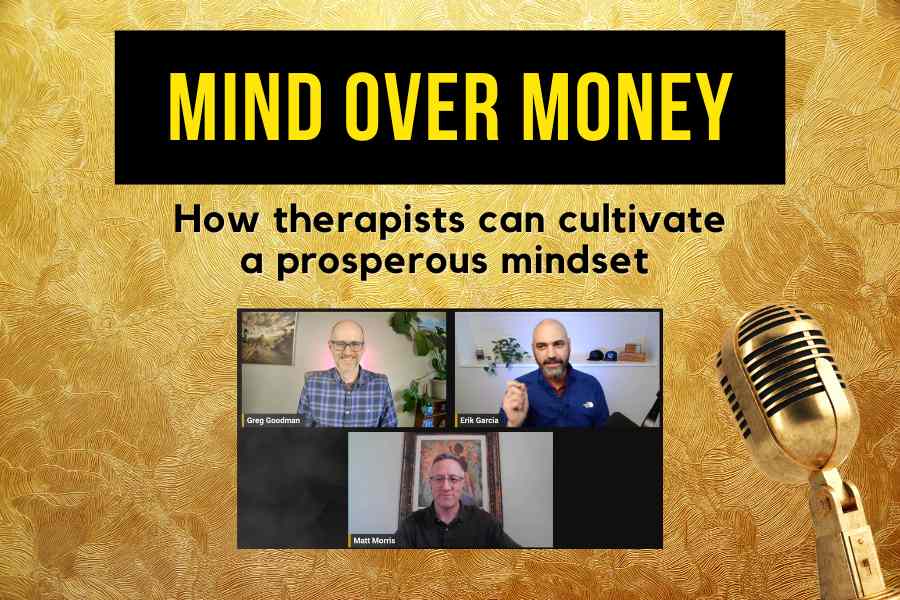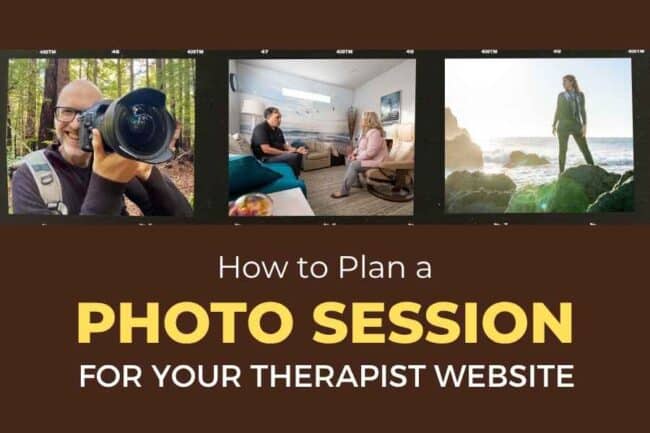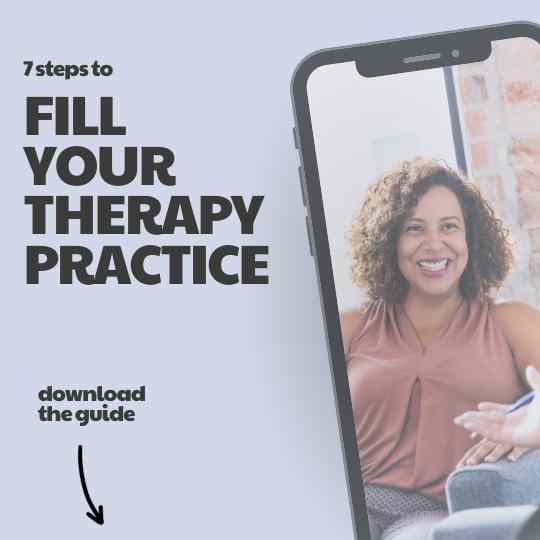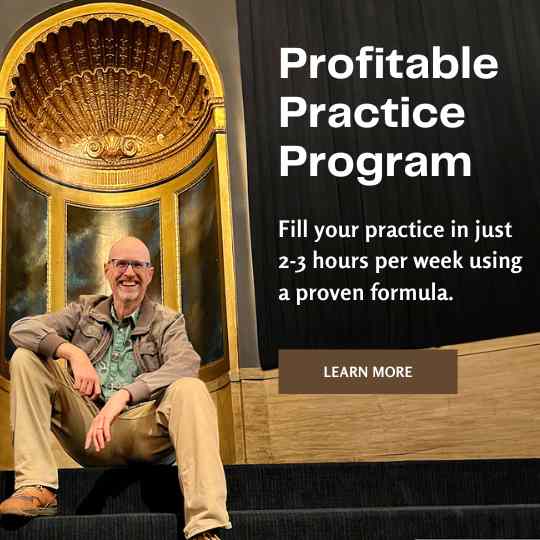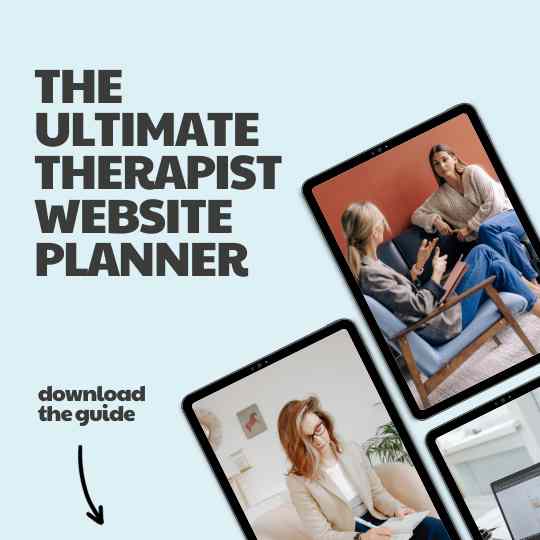In this enlightening chat, we delve into the crucial intersection of financial well-being and the power of connection within the therapy profession.
Featuring insights from Erik Garcia, a Certified Financial Planner, Dr. Matt Morris, a seasoned family therapist and a professor of counseling, and Greg Goodman, a therapist marketing coach, this conversation is a treasure trove of wisdom for any therapist looking to thrive both personally and professionally. Click play and learn:
- The importance of adopting a healthy money mindset.
- Strategies for financial planning specific to therapy businesses.
- The profound impact of building a community-focused practice.
Watch the Roundtable Discussion
About the Participants
Dr. Matt Morris, Ph.D., LMFT, LPC

As a professor of counseling at The University of Holy Cross, Dr. Morris extends his passion for relationships into academia, where he trains upcoming counselors, engages in family studies, and shares his enthusiasm for learning. His role as an AAMFT Approved Supervisor and board-approved supervisor underscores his commitment to elevating the counseling profession, fostering a new generation of therapists equipped with the knowledge and compassion to impact families positively.
Dr. Morris’ academic contributions are complemented by his practical approach to therapy, making him a respected figure in both professional and educational spheres.
Beyond his professional achievements, Dr. Morris’s personal life as a devoted husband of over 20 years and a father actively involved in raising great kids offers a testament to his belief in the power of strong, healthy relationships. This personal commitment to family life enriches his professional practice, providing a solid foundation for his work with clients and students alike.
- The Relationship Doctor — Dr. Matt Morris & Associates
- Building Us Podcast (Spotify)
- Connect with Dr. Morris on LinkedIn
Erik Garcia, CFP, BFA

In 2020, Erik expanded his influence into the podcasting world with the launch of the “Building Us” podcast, co-hosted with Dr. Matt Morris, focusing on the intricate dynamics of relationships and finances.
He currently co-hosts the “Stuff About Money” podcast with Xavier Angel, aiming to fill the educational gap on practical financial knowledge. Beyond the airwaves, Erik is a sought-after speaker and a regular feature on industry podcasts, where he shares his expertise on investment management, financial planning, and the psychological aspects of personal finance.
Erik’s contributions to financial literacy are further exemplified in his e-book, “5 Pillars of Financial Security: A Guide To Managing Your Money Wisely,” which encapsulates his philosophy towards achieving financial well-being. Through his work, Erik Garcia remains a pivotal resource for those seeking to navigate the complexities of finance with confidence and clarity.
- Plan Wisely
- Stuff About Money Podcast
- Budgeting Made Easy Course
- Connect With Erik on LinkedIn
- Plan Wisely YouTube
Greg Goodman, Therapist Marketing Coach

With a rich background that melds creativity with technology, Greg’s journey began in the realms of photography and graphic design, where he honed his eye for aesthetics and storytelling. His passion for these fields evolved into a deeper calling as he transitioned into web design and marketing, recognizing early on the pivotal role these elements play in building successful businesses.
Greg’s approach is deeply rooted in the belief that every therapist has a unique story to tell and a dream client waiting to hear it.
This philosophy underpins all his work, guiding therapists to not just market their services, but to connect authentically with those they are meant to serve. Under Greg’s leadership, Goodman Creatives has become synonymous with heart-centered marketing, offering services that encompass web design, copywriting, branding, and coaching. His ethos is not just about creating visually stunning websites or compelling marketing campaigns; it’s about crafting a narrative that resonates with both the therapist and their potential clients.
Greg is committed to the success of each client, employing a blend of strategic thinking, creative execution, and ongoing support to navigate the complex digital landscape. His work empowers therapists to identify their niche, articulate their value, and attract their dream clients, turning passion into profit. Through Goodman Creatives, Greg Goodman has redefined what it means to be in the business of helping others, ensuring that therapists not only find their voice but make it heard in the crowded digital space.
5 Key Takeaways From the Conversation
1. Embrace Financial Health as Your Practice’s Backbone
Understanding and managing your finances are paramount to the stability and growth of your therapy practice. Key strategies include:
- Developing a solid grasp of financial management for both personal and business finances.
- Making informed investment choices to secure your practice’s financial future.
- Crafting a flexible budget that can withstand the ebb and flow of income specific to therapy practices.
2. Cultivate a Community-Centric Practice
The strength of your practice lies not just in the number of clients but in the quality of the community you build around it. Essential elements are:
- Encouraging strong, supportive relationships within your team to foster a collaborative and nurturing environment.
- Creating spaces and opportunities for clients to connect and support each other, enhancing their therapeutic experience.
3. Commit to Lifelong Learning for Sustained Relevance
Staying informed and educated on the latest in therapy and business practices ensures your practice remains competitive and effective. This involves:
- Pursuing ongoing professional development opportunities to enhance your skills and services.
- Integrating new knowledge into your practice, offering clients the most current therapeutic approaches.
4. Leverage Authentic Marketing to Connect Deeply with Clients
Using genuine, story-driven therapist marketing strategies and an effective therapist website can significantly impact your practice’s ability to attract and retain clients. This means:
- Sharing your personal and professional journey to create meaningful connections.
- Highlighting what makes your practice unique to stand out in the therapy landscape.
- Being transparent about your therapeutic methods to attract clients who resonate with your approach.
5. View Collaboration as a Path to Growth
Seeing other therapists as collaborators rather than competitors can enrich your practice and the broader therapy community. Collaborative efforts can include:
- Establishing referral networks to ensure clients receive the care they need.
- Partnering on events or workshops to broaden your reach and impact.
- Building a network of support among peers for shared learning and success.
[Greg Goodman]
Hello, everybody. Greetings, mental health therapist community. I am here today.
I’m super excited to be joined by Eric Garcia, who is a certified financial planner and podcaster. He has a podcast called Stuff About Money They Didn’t Teach You in School. And Dr. Matt Morris, who is the founder of Matt Morris and Associates, a wonderful group therapy practice focusing on relationships in New Orleans. And he is also a professor of counseling at University of Holy Cross. And we are here today to talk about something that in my experience as a therapist, marketing coach, therapist, business coach, a lot of therapists struggle with, and that is money, money mindset, and sort of being in this entrepreneurial mindset, because real talk, you’re a business owner, right? You’re a business owner.
And as a business owner comes the responsibility of managing money, managing budgets, managing, you know, potentially employees, clinicians, associates, and what does that even look like? And how do we shift out of this world of, you know, a stat that shocks me all the time is that less than 79% of therapists spend less than $100 a month on marketing. And that’s marketing as a whole.
And we were just having a little chat before, and we decided to turn on this video, Eric was saying that that’s pretty standard across businesses as a whole. So I guess I’m just going to kind of, I’d love to have Matt give a little bit more detailed introduction on you and your background. And we’re just going to chat, we’re going to talk about money, we’re going to give you some ideas of how to maybe start shifting that mindset.
And I don’t know, we’ll see what rabbit holes we go down and where this all goes.
[Dr. Matt Morris]
Yeah. Thanks for having us, Greg. And happy to talk about all of those things.
And just to introduce myself a bit more, I am in private practice. My private practice has grown over the years, it’s gone through several different iterations. And I had to learn most of this as I went along.
I can still remember opening my first appointment slots and having my very first client in private practice, and how far I’ve come since then. And so now, you know, I have a practice in New Orleans. There are now six or seven associates in the practice.
We’re seeing clients all the time. And it, again, it has, it has just gone through these different iterations of what it means to have a practice. And I’ve had to learn a lot of business stuff along the way.
And I’m excited that we’re going to talk today about something that’s probably a little bit more philosophical, but is just the the decision that therapists make the mindset that I’m going to make some money doing this. And I’m going to, I’m going to figure out a way to get comfortable with spending money to make money. And as part of that on marketing, and then one other piece to this.
I don’t know how much of this you know, Greg, but a lot of this journey for me, Eric has been right there with me, we’re dear friends in New Orleans. And he has helped coach and support me along the way, introduced me to people along the way that helped me figure out how to how to make and spend money on my practice on my business.
[Erik Garcia]
Yeah, it’s been it’s been a fun, it’s been a fun journey. Thanks for having me, Greg. This is going to be a love, obviously love talking about money as a as a financial planner, financial advisor.
I like to say that money touches just about every aspect of your life, right? We probably spend 80% of our day, either working for money, complaining about money, spending money. So the way we manage our money is really important.
And, and what I found, and this is really, I found this really working with Matt, Matt and I started collaborating years and years and years ago, he he reached out to me about I think a client he was coupling and he gave them money advice. He said, I think they’re having money issues. And this is the this is the advice I gave was a good advice.
I’m like, yeah, that’s pretty sound advice. And that kind of launched us into the season of really collaborating on money in therapy. And one of the things I took away, I actually learned probably more about delivering my advice to clients by interacting with Matt and other therapists.
So I learned how to counsel, if you will, find we call it financial therapy. I’m not I’m not a therapist. But a lot of times what I found was people are dealing with some deep rooted issues and trying to make money.
This is I’m trying to motivate people to save money. But yet they have deep rooted issues that they overspend or they’re afraid of certain things. And I’ve learned from from Matt and other counselors about family of origin and really understanding and listening and planning is as important as as the actual plan itself.
So I have learned a ton about delivering financial advice from from hanging out with therapists. And I always think that there’s a really powerful thing when you can cross pollinate with other with other professionals because we have blind sides in our professions. But yeah, I’m a certified financial planner.
I actually ended up getting that designation through some of the work that Matt and I started doing. I was pursuing a different designation. And I decided I wanted to go the planner route because Matt accidentally opened up a part of my industry to me that he probably didn’t know about that I knew about.
But he kind of almost redirected me, if you will, and then ended up getting a doing a lot of studies and kind of behavioral financial advising what that looks like. So this is this is this is fun. I talk to my clients from a wide variety of topics from investment management to getting out of debt to to cash flow management, budgeting.
I’m air quoting for those listening. So yeah, great.
[Dr. Matt Morris]
We are probably going to have to give Eric a honorary counseling degree at some point because he spends so much time talking to therapists and listening to therapists and supporting therapists. You know, when I was in graduate school, there was a movement to try to combine the counseling departments of some universities with with what’s it called financial planning departments of the university. So combining these two things into these financial therapy programs or financial literacy programs where therapists who who try to help and support and coach people all of the time should learn some financial literacy so that when we’re working with clients on their own finances, we can at least start the conversation.
And, you know, I’m not often coaching people in the the tactics or skills, the technical aspects of budgeting, but I might be coaching them. I was yesterday coaching a couple into just how to have a more productive conversation about money. And so as money comes up in the counseling field, Eric and I found that, man, there’s a lot of overlap in our in our industries and we can work together.
And we’ve we figured some of that out. And along the way, Eric and I have also figured out that, man, there’s a lot of therapists out there that are just not very comfortable with money. And, you know, they they love doing their work, but they don’t really want to talk too much about how much they make or how much they charge or how much they should be charging or how much they should be investing in their business.
Just as one example of that, Eric and I had a friend who’s a therapist and and she would counsel someone and and that client would pay her and that payment, that remuneration, is that the word, that payment she would assign to something in her life like this is going to pay for me to get my nails done or this is going to pay for me to get my dogs groomed. I mean, she was that granular at like each client had their payment was going to be assigned to some aspect of her life. And that’s a very different sort of way to think about business than what I think we’re trying to aim for, which is where do you want to go and are you comfortable making money and then what kind of how much money do you need to spend to make that money?
[Erik Garcia]
Yeah, I think that’s an important comment. Matt, you just said something there that I want to kind of capture really quick. How much money do you need to spend to make money?
I’ll often talk to people about the difference between saving and investing. So, saving money is I’m putting money away in a safe place so I can have it in the future.
[Dr. Matt Morris]
Yeah.
[Erik Garcia]
Investing money is I’m spending money on something with the expectation to get something back in return, right? So, for example, I’m saving up for a down payment on a house. Okay, putting money in the bank.
I’m investing in Apple stock. For example, I’m spending money, buying, exchanging money for a share of Apple with the expectation that Apple sells a lot of iPhones and iPads and virtual reality goggles and eventually maybe self-driving cars and my whatever $180, $190 per share that I just exchanged will one day be $250, right? So, that’s investing.
So, it’s a mental, it’s a mindset that as a business owner, I’m not just in the business of delivering my service, right? Greg, you do digital marketing and coaching, right? So, you exchange that skill and that service for money.
Matt delivers counsel, trades his time for money. I do similar things. I manage money.
I deliver financial advice. I get money in exchange. But at some point, if we want to grow, acquire clients, build a practice like Matt is, it’s going to cost us money to do that.
And I think that’s a hard thing, especially if we’re not comfortable with business, if we’re not comfortable with, if we’re unsure making decisions, right? I see more people in your stat about what, it was 70% spend less than $100. I want to bet that like, you know, if you, if the therapist sat and said, okay, I bill, I don’t know, $100 an hour, $150 an hour.
If you sit there and figure out how much you spend, how much you make delivering your service, you’re probably spending a lot of money in lack of decisions, right? In procrastination. I see more people waste money or lose money because they don’t make quick enough decisions in business because they’re not comfortable with it.
Right? So I think that’s a, that’s an important, it’s an important step of like Matt said, understanding this idea of I’m spending money to make money and then talking to that. What does that look like?
How much money should I be spending and what should I expect in return? Right? That’s like the next level conversation in business.
We call that return on investment, right? I was talking to a buddy of mine a long time ago. He worked for a big corporation and they had 400% any dollar they spent, they needed to get $4 in return.
Otherwise it wasn’t a good investment.
[Greg Goodman]
So the interesting thing, I appreciate it. Thank you both for everything. I’m like on the edge of my seat, just listening in, you know, what comes up to me, and this is one of these challenges with the world of marketing, especially digital marketing and even traditional marketing is you’re talking about ROI and it’s not always as simple as, you know, invest a hundred bucks today, you’re going to get $500 back tomorrow because so much of marketing is this foundation building is the groundwork or the proverbial billboard on the side of the road that someone, you know, company spending $500,000 on for cars to drive by stuck in traffic, hoping that in three months when they need, you know, surgery, they’ll think of health or whatever, you know, whatever the thing is that they’re advertising. So it’s, you know, I’m curious too, what is the balance between that ROI and that sort of just, and maybe this also comes back to the idea of just how to shift the entire thinking around you need to invest money to make money type thing when there is not as clear a trajectory.
[Erik Garcia]
Yeah.
[Greg Goodman]
And when you’ve got, you know, you’re straddled with debt and you’re straddled with, you know, bills that you need to pay and insurance and all the other things like, you know, Matt, how did you, how did you, at the end of the day, you’ve always kind of had a bit more of an entrepreneurial mindset, but yeah, that’s, that’s sort of where I don’t know that I did really.
[Dr. Matt Morris]
I think that it was something I had to cultivate and learn, learn and cultivate. I don’t know that I was particularly entrepreneurial. This is certainly the first business that I’ve ever owned.
Um, I remember years ago when I first started the practice, I built a little website through godaddy.com or something. And, um, Eric saw the website at some point and he goes, oh, I see you have a website. And I’m like, yes, how is it?
And he goes, well, you have an online presence now. That’s good. And so I said to him, you know, I think, okay, okay.
I hear what you’re saying. I’m reading between the lines. My website is not very good that I built myself because those are not skills that I have or had.
Uh, at the time I was doing my best and, uh, it was clear that it, it, it wasn’t great. Eric wasn’t a huge fan of my homemade website. Then I started to talk about what, what would it cost to get a real website that looks as professional as I want my practice to be?
I mean, the, the, what clients, what, what potential clients see online about me is, is the, is, is the best seller, the best sell I have. And so I started talking about what would it cost to get a website? And I was so shocked at how expensive that website was, but I made the decision that I was going to work and I was going to save money until I had a pot of it.
And then I was going to take that money and spend it on a website because I believed that if I like, like what happens when I plant my garden in the backyard, I put the seed in the ground, I water it, I fertilize it, you know, and I do that for weeks or months. I believe a crop of cucumbers is going to eventually come up. I thought that’s what was going to happen with a website, a really good website.
I believed clients are not asking their friends or family or their doctor, who should I go see? They’re, they’re Googling it. They’re looking online.
So I needed a website that attracted clients to the practice that I wanted to have. And I was willing to spend money for that. The website became the best piece of marketing I ever spent money on.
I mean, it worked for me 24 hours a day, and it attracts all kinds of people. I spoke to a person today who was looking for therapy. And she said, you know, when I just looked at your website, there was something about it that said, I’d like to meet with this guy.
And Greg, I know you’ve helped me with my website over the years. So you have real skill in this that I don’t have.
[Greg Goodman]
But I want to be clear to everybody watching, I did not make Matt’s website. He did that. He did not, I did not make that with him.
And Matt’s website is one of the best therapist websites out there in terms of speaking directly to your, to your dream client in terms of making that connection and color palette. It’s elegant, it’s bold, it’s classy. And it speaks so much without having to say a single word.
You have less text on your website than I recommend for most therapists. But because of the way that you presented it and that design and everything, as you’re saying, it works beautifully to make this connection that you’re talking about this person sharing with you.
[Dr. Matt Morris]
I love your website. Well, and you’ve helped me in a number of ways over the years. And I’ll talk about that in a minute.
But you’ve helped just encourage me in that way that you just said, like, it’s good. It’s good. You’re doing, you’re on the right path.
You’re, you’re doing well. And the website that I have today, it’s probably the fourth or fifth generation of the website. So it, it has been updated and changed and tweaked, but it still works.
It’s still the best piece of marketing I have recently. Let me tell a second story. Now, recently, I called Eric, my friend.
And I said, you know, I’m thinking about, I’m thinking about buying a sign for the outside of my building. I’m in a large office building. And there’s a large sign outside of my office building.
And it had a little space open that tenants could put their sign in, you know, so I could hang up a physical sign. And so I contacted the sign people about this. And they, they told me how much the sign costs and it freaked me out.
It was so much more expensive than I was prepared for. Now, I had saved money because, you know, I’ve come to realize that things happen that I don’t expect. We had a pandemic, you know, things happen that I’m not always prepared for.
So I need some money in savings, but the money had been sitting there for a while. And we were kind of over the hump. So I contacted the sign people, super expensive.
I called Eric and I said, here’s the price of the sign. What do you think? And he helped talk me through like, okay, well, you know, that’s if you get this much business from that sign, if you know, it’s a one time investment, but it’s got an ongoing maintenance monthly fee to have it on the sign.
You know, how many clients would you need to recover that cost? And we just sort of computed that that, okay, if I pick up a client a month, you know, within about, you know, depending on how much the client ends up being worth to my practice in terms of monetary value, I’m going to pay that sign off in a year, I’m going to recoup the money in about a year, year and a half, if I pick up one a month, my sign is on a busy road. And Greg, check this out.
There’s a train that crosses the road six or seven times intermittently a day, you never know when it’s going to happen. So what happens, you look outside and people are on the street, they’re parked. And my my sign is the lowest one on the sign.
So it’s just like an eye level when you’re sitting in a car. Yeah. And it just says, couple and family therapy.
And I believe the people that there there’s a percentage of the people in those cars that are wanting their relationships to be better. Sure. And so I think I don’t know now how much business the sign is getting me.
But the other day, it’s Mardi Gras here in New Orleans. I was at a parade the other day. And a guy came up to me and he goes, Hey, I saw your sign on the building, on the streets of Mardi Gras.
[Greg Goodman]
Yeah.
[Erik Garcia]
So so so let me I made a couple of notes here as Matt was talking. And I kind of want to I kind of want to go sit in a couple of these different places for a little while in kind of he sounds like a therapist. No, I think there’s a lot there’s a lot packed into what Matt just said.
It’s really important. So let’s let’s kind of start with the most recent the sign. It’s really knowing your metric.
But Matt does a really good job of he understands his metrics. He knows what he knows what he makes per hour. He knows how much he gets for his therapists per hour.
And the number was a big number on the front end. It was like a two or three year contract. So he said, OK, you’re really you’re really paying this out over three years.
So it’s not. Yes, it’s this number one time, but let’s do it on a monthly basis. It’s only this much monthly.
OK, and you make X amount per month. That’s really only one and a half clients per month. Can you do that?
Like, yeah, I can I can see one more client and my therapist, my associates. So really, when you when you know your numbers and you break it down, it’s not as scary. Money is I was talking to a client yesterday.
This is a younger client. This is the daughter of a business owner client of mine. My goal is to add massive value to my clients when they ask me if I can work with their kids.
A hundred percent. So she’s twenty five. She’s learning.
She’s learning. She’s going to learn about money. And she says, I got these six envelopes in the mail the other day for medical debt.
I haven’t opened them. I’m like, what are you waiting for? She’s I’m afraid what’s inside.
I’m like, let’s open them. So like you can’t be like, you know, put fear aside and face it and have someone with you who can talk you through maybe something that that that makes you afraid. Matt was afraid of that number.
So he called someone who could talk him through it. She was afraid of opening her envelope. So she, you know, in a meeting, opened them with me on the phone.
And then when you talk through it, it’s not it’s not that big of a deal. Right. So know your metrics.
Knowing your metrics is really important. And for therapists, I mean, Matt talked about, you know, what’s your what’s your price per hour. Right.
If you do insurance, you bill insurance. Don’t just say, well, I charge one bill at 150 an hour, but you also bill insurance. You got to figure out at the end of the day, what’s your average?
That’s a really important number to know. Matt talked about his website, building the website. And apparently my comment inspired a beautiful website.
What Matt was talking about was building a brand. And when you build a brand, building a brand and marketing are two are two different things. And this is your area, Greg.
So I’m not going to really get it.
[Greg Goodman]
I love hearing perspective.
[Erik Garcia]
Seth Godin, and I’m sure you’ve read some Seth. He’s kind of a marketing guru. He said he said in a crowded marketplace, fitting in as a failure in a business marketplace, not standing out is the same thing as being invisible.
So Matt’s website, he was invisible. He looked like any other any other therapist who built, you know, their website on their own. Nothing against therapists who built websites on their own, but he didn’t stand out.
Right. And branding is about standing out. It’s become it’s it’s it’s basically painting a picture of what you want people to see you.
We as business owners get to control how people see us. And do you want them to see you as a low budget website? You know, or do you want them to look at you and say, wow, this this this person is there’s something there.
OK, now we’re talking about building a brand as business owners. Right. If you’re a therapist who owns a private practice, you’re not only in the business of let me take a step back.
You make money two different ways. OK. One is you’re exchanging your time, your skill, your knowledge for money.
Right. Come see me for an hour and I’m going to give you advice and you’re going to give me one hundred and fifty dollars. Right.
That’s how it works. Right. That’s that’s the marketplace.
Now, if you have a practice and you have associates under you, you also get to make money off of people who are who are exchanging their knowledge and skill and time. Right. So you have to wear two different hats as a business owner and as a as a as a therapist, a business owner and a technician in whatever business you’re delivering a service in.
So you have to think like a business owner, right. You have to operate like a CEO. You have to make decisions that are going to grow the business.
There’s the. Now, look, if you’re a lifestyle business and it’s just it’s just me in a small office and, you know, I’m going to do 20 hours of therapy a week. Maybe you don’t need a big, fancy website that’s driving a bunch of traffic.
You just need a handful of clients, new clients per month. But if you’re trying to build a business, you’re going to have to make those decisions on how you spend your money. So understand the difference between building a brand right website, how you carry yourself, when you interact, when you’re networking with people.
There’s a lot that goes into it. Your email address. Right.
You know, Dr. Matt Morris at Gmail dot com at Gmail that have a business. Right. Dr. Matter Matt at Dr. Matt and Associates. Right. That’s something really inexpensive that that that it’s a really low cost that I think is a is a big return on investment. So there’s like little things like that.
You don’t have to go spend a ton of money on a website necessarily to have a successful practice. But you got to know where you got to know where you’re going. And Matt said, well, let me focus on one more thing.
Matt talked about if he goes and plants a garden and waters the garden and fertilizes the garden, I think sometimes it’s important that we focus on the the input and not the output. Right. So the input of building a business is I have to I have to spend money on advertising.
I’m not going to focus necessarily on the output and get lost on I’m going to have 10 new clients this month. The input is I have to write a blog this month. I have to do three social media posts this month.
I have to try to find a way to get on two podcasts this month in the industry or whatever. Like that’s the input. Focus on the input and the output will take care of itself.
And sometimes it’s a long it’s a long cycle before it starts to pay. But the beautiful thing about websites and blogging and digital marketing is it’s got a really long shelf life, really long life. So anyway, I was just trying to unwind some of the stuff that Matt said, and I probably threw a lot more out there than one thing.
[Greg Goodman]
And so you’re jotting down notes. I’m always jotting down notes. You know, the question that pops up for me is, how do you make these decisions on where to spend your money, not just marketing, like as a business owner in general, business owner who has personal expenses, a business owner who has business expenses, a business owner who wants to save up and take the family to insert place you want to take your family this summer, right?
Like all these different things. How do best practices for either of you of how to make the decisions, how to prioritize and also how to, you know, maybe not turn off, but, you know, maybe turn down the volume on that little voice saying, you know, how can I possibly do all of this? How can I possibly afford like this, this, the stress, the overwhelm, the, that other voice that’s trying to understand how it’s all going to ever actually work.
[Erik Garcia]
I’m going to say, I’m going to say two things. I just had this exact conversation with a different industry, with someone in a different industry. So first of all, be careful who you take your cues from.
So for example, you’re listening to this, you’re a new therapist in the practice. Matt might be a good practice to look at, to grow into, but you’ve got to understand Matt’s been doing this for a long time and it’s taken him a while to get to where he is. One of my favorite Proverbs says that a wealth made hastily dwindles, but he who gathers little by little keeps it.
It’s the same thing in business. Business that grows slow is more stable and more steady and more long lasting. If you go in and sometimes if you go and make business really fast and all of a sudden you got this like, Oh wow, I’m just made all this money.
Sometimes that, that business doesn’t last as long. So be careful who you’re taking your cues from. Okay.
That doesn’t mean don’t look to Matt as a model of where I want to go, but understand that Matt can do things that you just can’t do yet in business because you haven’t paid your dues. That’s really important. That’s a mindset thing.
Okay. Different stages in your career, right? No matter where you are in your career, you have to stop and say, okay, you have a business at the end of the day to support your personal lifestyle, right?
At the end of the day, I want to make money to retire, to go to travel, to whatever, whatever your passion is, whatever your purpose is, your business should help fund that. Now, or your business should be your passion. I know a lot of therapists just have a heart to help people.
So your business either should be your passion or it should fund your passion. Okay. I mean, eventually you won’t be able to do this for the rest of your life.
So you need to be funding something else. Right? So the first thing you need to do is stop and say, what do I need to cover my expenses?
Like, like bare bones, I’m building something. I’m willing to make an investment. I’m willing to, um, you know, to make hard decisions today so that one day I can have a practice like Matt or like insert, insert your, you know, therapist that that might be a mentor to you.
You’re gonna have to make tough decisions today, but there’s a reality I’ve got to pay rent or mortgage, got to pay insurance. I’ve got to feed my kids. If you have kids, I’ve got to all, all this stuff.
So you really have to know, what do I need to bring home? If I need $50,000 to bring home to support my lifestyle, then your business has to probably make, I don’t know, 75,000 cause you have taxes and rent and stuff to pay. So you have to start with what you need to take home.
And that’s going to drive some of your decisions. Um, you know, you might not be able to afford a big fancy website right now. Like Matt said, Matt’s on his fifth or sixth iteration of a website.
Maybe you start with a GoDaddy site. Maybe you start with the Squarespace site. I don’t, I don’t know, but you have to take small steps, small input, small input starts to starts to gather.
And then you can look back and say, wow, look what I built. It’s the same thing with money. Money grows exponentially, right?
If you start saving a hundred bucks a month, at the end of one year, you have 1200 bucks, right? But if you haven’t invested, and then the next year you’re 1200 that you saved this year is earning some return and then you add 1200 more. And then eventually it just grows exponentially.
I think it’s the same thing with business where we constantly, we’re consistent in putting inputs and building it, but you got to start with your number. What do I need to take home? And then from there you can’t afford a $10,000 marketing plan.
So maybe you spend 2000 on your marketing plan.
[Greg Goodman]
Yeah.
[Dr. Matt Morris]
I mean, you’re, you’re covering a lot of territory there. One thing that we’ve talked about offline a little bit and in previous conversations is that therapists do seem to struggle with just this, this scarcity mindset of they’re always just going to scrape by. They don’t see themselves as wealthy.
They don’t see themselves as being able to generate a ton of money. They just think about, you know, seeing another client so that that client can pay for their dog grooming that week or that month. And it’s kind of the scarcity mindset of being a college student and going to, I’m a professor.
So going to graduate school and, and all the expense that’s associated with that and living like barely paycheck to paycheck or loan to loan, make just barely making it. And then you get out in the workforce and your first job is at the lowest level of the ladder of the totem pole and you’re barely making it. Therapists have to acknowledge that that baked into them, this real fear that they’re not going to have enough money.
And so then making and spending money becomes a challenge that they have to overcome. Put on top of that, that we don’t teach our students, we don’t teach our therapist, we teach them all kinds of great stuff about being a great therapist, but we don’t teach them how to run a business. And so usually therapists are, are getting into private practice kind of on the side as a side hustle and, and they don’t know really what they’re doing.
And that’s okay. That’s all right. But it’s just an acknowledgement in our field that there are some structural issues to overcome.
One is that we keep you poor for a long time and two, we don’t teach you how to make money. And so it’s no wonder that therapists struggle with this. And I think it is just acknowledging that that is part of our field.
And so for you, the person who wants to go out and start a practice or, or improve your practice or really make money in your practice, you’re going to need to get some business coaching. You’re going to need to find some friends that you can talk to who are, who are entrepreneurs. You’re going to need to join an entrepreneurial group in some way.
You’re going to need to read some books or go to some classes or listen to some podcasts or something. You’re going to need to get some training so that you become more comfortable with the idea that I can make money. And then, then that sort of, once that mindset changes, then like Eric, what you’re talking about is you get dedicated to the input you get.
I can’t control how many cucumbers my garden is going to produce this year, but I can control to some extent how many seeds I planted, how much I fertilized, how much I watered it. So if I just get consistent and dedicated with, with that stuff, the input, most likely if you’re a good therapist and most of you are, but if you’re a good therapist, people will want to come back to you over and over and over again. Therapists are sort of, they, they sort of take pride in like not marketing.
They take pride in, I get all my clients through word of mouth. I’ve never done that. Okay.
Okay. But you don’t need to do that. That’s like, that’s like, you know, my garden, I don’t, I don’t even plant any seeds.
I just throw cucumbers out there and see what happens. It’s okay. I mean, I’m, I’m happy that some people do that or are able to build their whole practice by word of mouth.
I have a friend that does that. She’s super talented. She’s been in the same spot for a long time.
She has a niche market. She’s doing great. But if you want to pour gasoline on that, you can, you can do it through marketing, through very strategic marketing.
It won’t always work, but enough of the inputs will work out over time. Go ahead.
[Erik Garcia]
Yeah. I think that’s good, Matt. And Greg, you know, I’m asked a lot, as you can imagine, by, by people, like sometimes when people come and talk to me, there’s almost like, like a, like, oh, I need, I need a financial advisor, but I just never have any money.
So I really don’t need a financial advisor. Like, well, I do, I need one, but like, I don’t have money. So like, I’ll come to you when I have money or that kind of mentality.
And here’s the thing about money. There’s no silver bullet. There’s no one thing that there’s no prescriptive piece of advice that I can give you or Matt or your listeners to say, hey, look, if you do this one thing, you’re going to be okay.
Now there’s principles that I’ve learned in money. Like if you follow these principles, you’re going to, you’re going to be successful, right? It’s very hard not to become successful.
Like, for example, three things that when people are real quick, what do I need to do to, to, to, to be a millionaire? Okay. Real simple.
You need to spend less than you make. Number one, you can’t spend more money than you make. We call that debt.
That’s a bad thing. Right. Well, okay.
Well, let’s talk about spending. Oh my gosh. Like I’ve learned that there’s all kinds of like things that, that we spend money for different reasons.
We spend money because it makes us feel good. Some type of like it’s therapy, right? How many times have you heard that?
I wouldn’t, yeah, my credit card’s high because I don’t know, I was feeling depressed and I spent a lot of money and it made me feel better. Like shopping therapy or I spend money because it makes me, I buy expensive things because it makes me feel more, more powerful or more, I don’t know, um, authoritative and other people’s views, whatever. So spend less than you make, save as much as you can, right?
There’s a gap between if you spend less than you make, there’s a gap, save that, invest that. That’s what you have to grow your business. And at the end of the day, the third thing is don’t do anything foolish with your money.
Now I would say this, it’s easier said than done. Um, the, the, the, the really important thing there is you got to learn to spend better. You got to work the muscle to save more and you got to surround yourself with people who are going to keep you accountable to not do something foolish with money.
Foolish could be overspending on a terrible website. Foolish could be over, I bought more car than I really should have had. Foolish could be, I don’t know, taking out, you know, a loan when you shouldn’t have, right?
When you should have spent less. So I think it’s easier said than done. And we can talk about some tactics in another conversation if you want, but Matt said it’s a mindset and uh, you know, the way you think will ultimately impact the way you, the way you make decisions and decisions obviously have consequences, good or bad.
It’s no different than with money.
[Greg Goodman]
Yeah. I, I, and I, I’m looking at the time and I know, uh, I’m so grateful to the two of you for, for your time and for all this amazing value and information that we’re sharing with everybody watching. Um, and I would love to, I would love to continue this conversation and in, in a future podcast and a future sit down with the three of us, cause I think there’s still a lot of real juiciness here and a lot of, you know, a lot of forward momentum that, that people can and need to make, uh, to, to grow a successful therapy practice, to shift that scarcity mindset, to, to start thinking of, you know, of this as an asset that is being grown just like $1,200 a year in the bank that’s going, you know, compounding at 5% interest or whatever it is, right?
Like this is, this is something that whether there’s a business background or a money mindset or not, you know, this is your business. This is what you have dedicated thousands of hours and hundreds of thousands of dollars to, to, to doing with your life. And it’s, you know, which, which path are you going to take the path of, of resistance or the path of just, you know, moving, moving forward with, with excitement about, about spending money, about being a business owner, about being an entrepreneur, uh, and embracing that part of this.
So that’s sort of my, you know, not, not being a therapist, but working with therapists for 18 years. It’s like, this is just the biggest thing is the fear that I hear over and over again, the fear of spending money, the fear of raising rates, the fear of coming off insurance panels, basically the fear of what if it doesn’t work, right? That, that is sort of the underlying message is I’m afraid of failing.
And so it’s, you know, to me and my, it’s like, what happens if you succeed wildly beyond your dreams? Um, right. And that’s again, a whole other conversation, but I would love to just sort of wrap this up.
I’m going to ask each of you for sort of one final word of advice or, or wisdom. And I would also love any, um, book recommend, I heard both of you mentioned book surrounding yourself by, by reading books and podcasts. So I’d love other than again, you know, Eric’s is stuff about money.
They didn’t teach you in school. And I love that Eric and Matt together have a podcast called building us invest in your relationships, which, uh, hopefully we’ll be having some new episodes soon. We shall see, but regardless, those are two that you should put on your podcast list.
And I’d love to just end this and Oh, and the last thing I’ll say too, is I’m going to post some resources, uh, as well, you know, Eric, Matt, any resources that you have that you think would be, we don’t need to dive into what they are now, but that you think would be helpful for anyone watching this to have. Um, I will also share those below. So yeah, let’s word, word of wisdom, recommended podcast or books, and then we shall say, I do.
[Dr. Matt Morris]
Um, go ahead, Matt, you go first. You know, I think, I think for me, it, it really was building some relationships with people that aren’t necessarily therapist, um, therapists, I think can get, uh, sort of insular in their community. And, and we know we, you need to know lots of therapists that’s important, but you also need to know other people.
You need to know other entrepreneurs who are building something and, and just hear their stories, learn what they’re doing, learn their processes, what works, what doesn’t work. And you’ll start to get, you’ll start to get new ideas, new, new, uh, you know, you’ll, you’ll think of something different. If you, if you, as Eric said earlier, as you cross pollinate with other professionals who are both trying to be, who are all trying to build something, it’ll rub off on you, uh, and you’ll support them.
So it’s win-win.
[Erik Garcia]
Yeah. Um, a book recommendation, I would say, I read this a long time ago. Um, it’s called the e-myth.
You may have, you may be familiar with it, um, by Gerber. I think his last name is, I think that’s a really good book for, um, a business owner to read, understand, um, in particular. Yeah.
To understand the different roles that you play as a business owner. So that’s a good one. Um, and, and I would say like, like Matt said, find a team of people.
That’s what Matt and I, it was me, Matt, and another friend of ours who happens to be a therapist. And we just started getting together. It was fun to be like 10 years ago and we would write our business plans and we would like pitch it to each other.
Um, and then we would kind of ask questions and we could bounce ideas off of each other. We ended up calling it Shark Tank, but, um, I still do my business plan and I still call it Shark Tank. Um, but, but we surrounded ourselves with like-minded people, different industries.
And, um, and I would say we sharpened each other and we, we became better business owners and better practitioners of our, of our, you know, of our industry as a result of it.
[Greg Goodman]
Awesome. Yes. Everybody should have a Shark Tank, whatever, whatever name we give it.
I love that advice. And just, you know, what does it equate like if you want to be successful, surround yourself by successful people, you know, you should be, you know, if you want to up-level, you should be the least successful person in the room so that you can learn and be inspired by those around you. And that’s just, I always find a lot of power, a lot of power and a lot of inspiration and learning from those who have walked the walk and paved the path before you, because we’re all, we all make mistakes on our path and we all make, you know, decisions that looking back, it’s like, oh, I could have done that differently.
And how amazing to be able to hear that story from someone else and, and to have the validation of your ideas based on someone who has tried these things before you, as opposed to a bunch of people just trying to figure it all out at the same time. Thank you, Matt. Thank you, Eric.
I appreciate you both deeply. Um, and yeah, I will, I’ll drop some links and some resources and podcasts and all that below, and hopefully we can continue the conversation another day.

